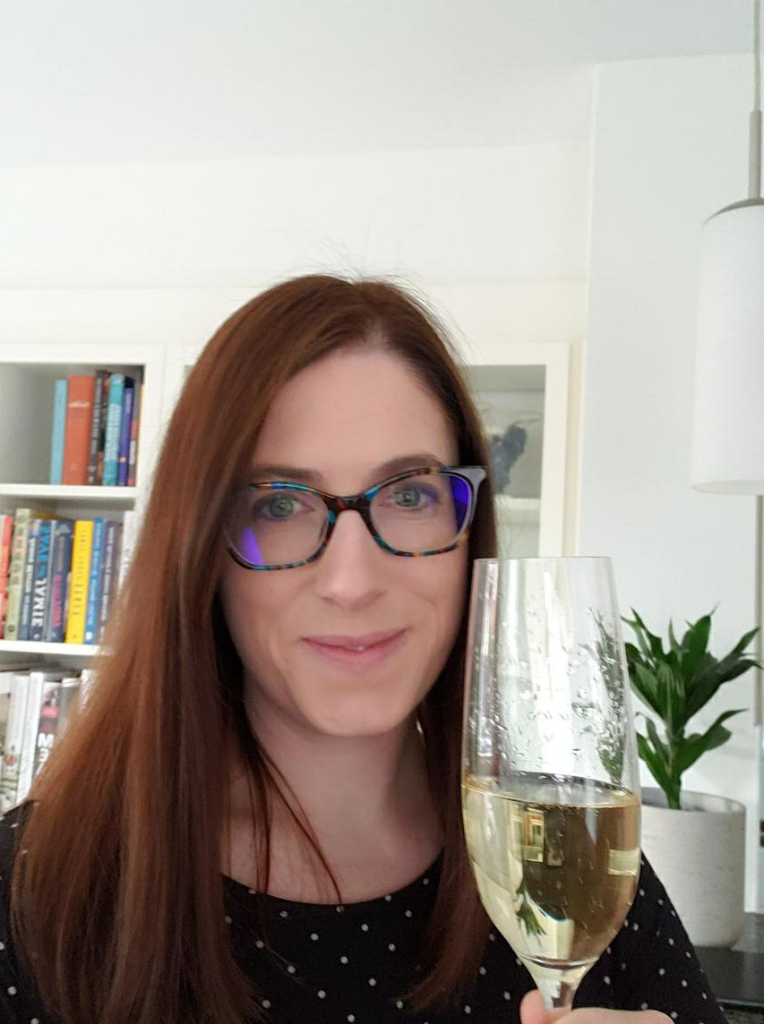The last two months of my life have been consumed not by COVID-19, but by my role as Chair of the Program Team for the Association of Canadian Archivists’ 45th annual conference. This journey began in February, 2019 when the ACA Board accepted my theme proposal for the 2020 conference and appointed me to serve as Chair. What I could not have foreseen was that, as it turned out, my theme: 20/20 Vision: Seeing Archives Differently, could not have been more appropriate for the times that lay ahead. 2020 has forced us all to see things differently.
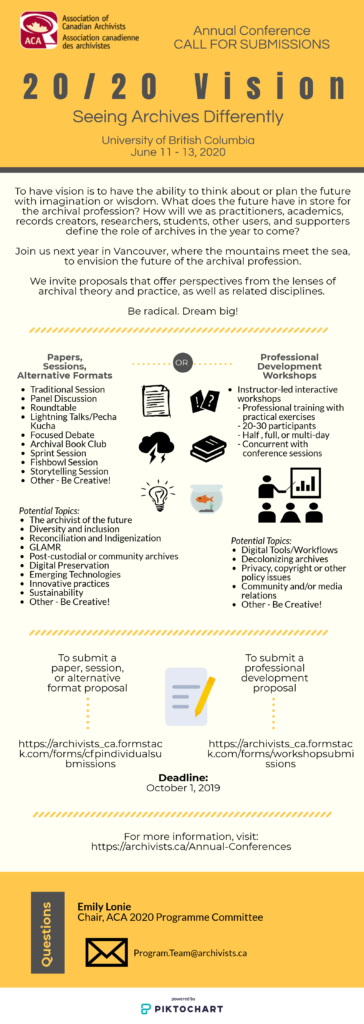
The Call for Submissions for the conference was issued in August, 2019 and the Program Team received eighty-seven submissions (36 individual papers, 41 complete sessions, and 10 workshop proposals). We assessed the submissions as per usual at the Priorities and Planning meeting that took place at the University of British Columbia in November, 2019. The Program Team met over two days and put the program together, whittling down the number of submissions to fit the limited conference spots we had to fill. It was tough, but by the end of those two days we had an excellent program that we were super excited about. The stage was set for a memorable conference in June, 2020 at the University of British Columbia.
And then, well, COVID-19 happened.
As the realities of the pandemic dawned on all of us, I consulted with the ACA Board and Jo McCutcheon (ACA Executive Director). We debated cancelling outright, postponing, or perhaps offering a smaller virtual conference of some kind. By the end of March we knew that holding the conference in person was not an option and that postponing might result in the association being on the hook for costs it couldn’t recover.
I admit that I was pretty devastated by the decision to cancel the in-person conference, even though it was, of course, the right thing to do. My team and I had worked so hard and our colleagues had submitted such thought-provoking papers and sessions. It took me about two weeks to come to terms with losing the conference as we had conceived it. All of this was happening while I was incredibly sick, the world was falling apart, I was worried about my personal employment situation, and we were all in lockdown away from family and friends. I don’t have to tell you – these were tough times.
In the end, we decided to explore the idea of a virtual conference. Maybe a one day affair with three or four sessions. It took me a bit of time to wrap my head around the idea of doing an about face and organizing a completely different conference, but man am I glad I got on board! And once I turned my attention to the pivot, I didn’t look back.
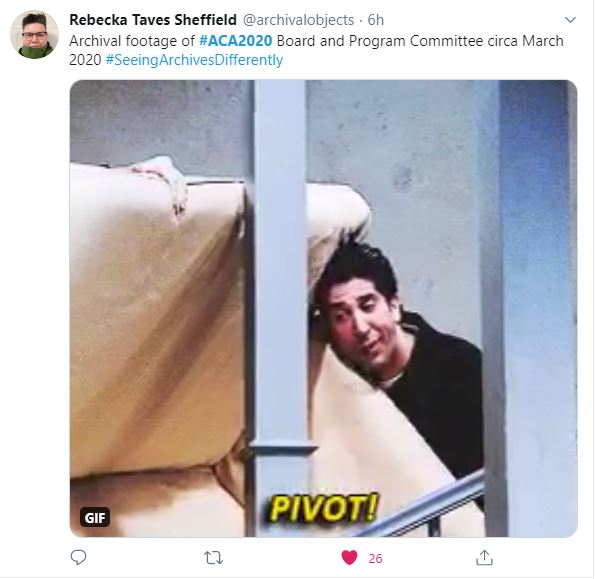
Within a few weeks, it became clear to us that we could do so much more than a one day conference. We decided to really stretch ourselves and offer essentially three days of content – including concurrent sessions! Over the next few weeks, we contacted all speakers, completely reworked the schedule, sourced all the necessary technology, learned all the necessary technology (I now know more about Zoom than I ever thought I would!), and by the end of April we opened registration for the ACA’s first virtual conference.
And then, with just over a month to go, the work really began! We added all of the speakers and session descriptions to our conference platform – Whova. We uploaded everything to the ACA website. We tested, and tested, and tested some more, scheduled all of the Zoom webinars (26 in total), hosted twenty Zoom practice sessions with speakers, sent about a million emails, prepared slide decks and remarks, and developed a set of questions for a trivia night to close out the conference. From June 1st, I was essentially working two full time jobs. My husband gave up on seeing me and I sat at my computer for more time than I ever care to again. BUT – all of it was SO worth it!
It took a lot of courage and vision to see the conference differently and my goodness I could not be happier with how things went. ACA 2020 was truly historic in many ways. The conference brought together 85 speakers from across Canada and around the world and over 500 attendees! That’s a new ACA attendance record. Through corporate sponsorship and generous donations from members, we were able to provide free registration to nearly 100 students and professionals experiencing precarious employment or job loss. The virtual format provided unparalleled accessibility, affordability, and sustainability, and I would argue a kind of sociability that may not always happen in person (more on that below).
Day One
Over three days, the archival community came together to hear evolving ideas and to contemplate new directions and new priorities for the profession. On Day One, we got to “meet” Leslie Weir, the new Librarian and Archivist of Canada and hear about her thoughts on the future of LAC. 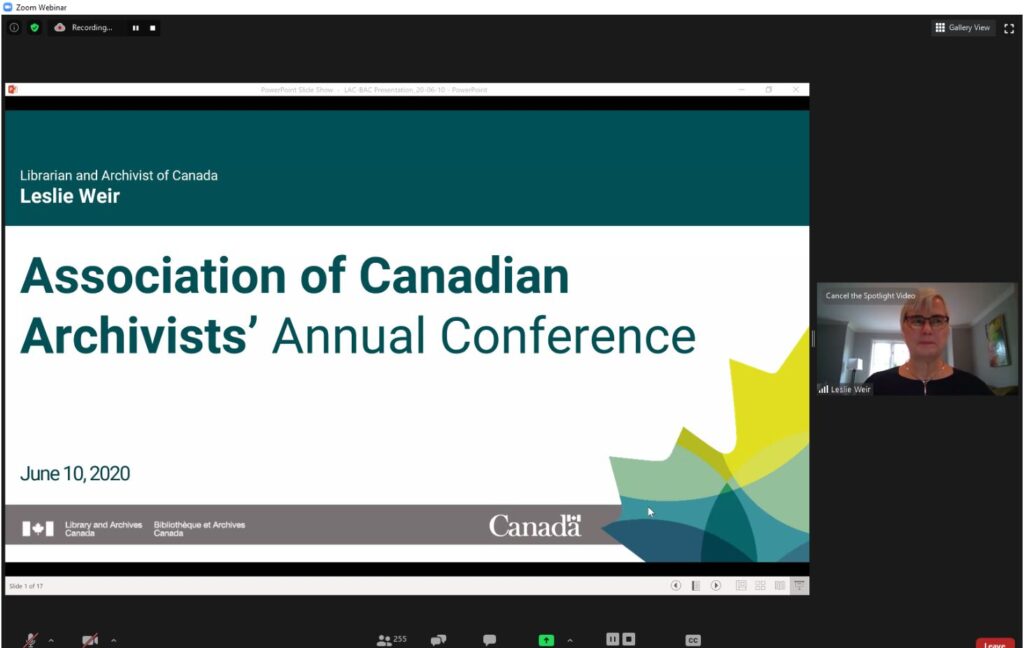
Afterwards, we got to toast the tremendous impact of Terry Cook while launching the new book, “All Shook Up” The Archival Legacy of Terry Cook. The book launch was sweet and surprisingly intimate for a virtual event. It featured many of Terry’s friends and colleagues each providing their memories of him and their impressions of the impact he made on the archival community around the world. If you missed the session, you can check it out on Facebook (where it has been viewed nearly 3500 times!) You can pre-order the book now from the Society of American Archivists’ book store.
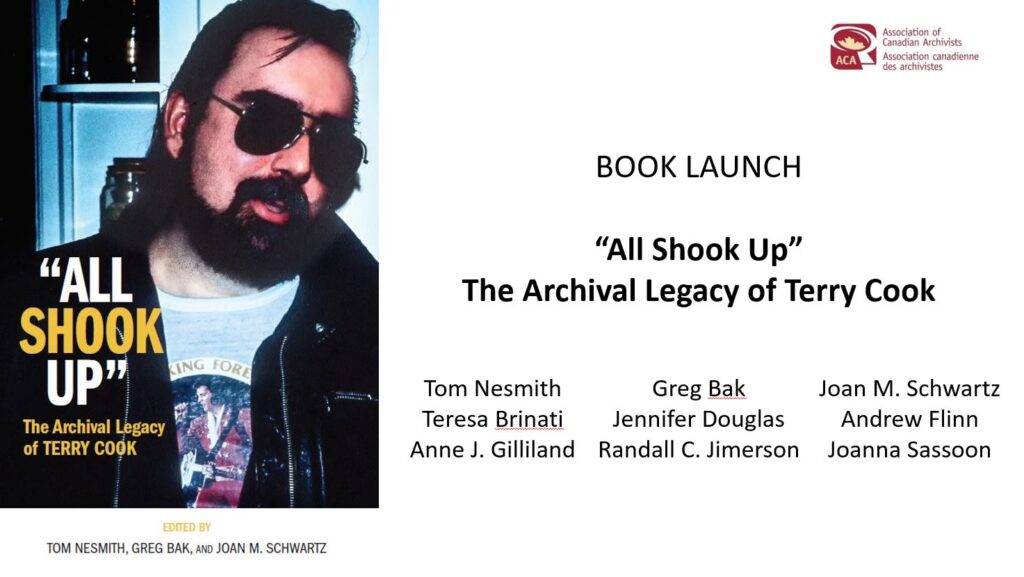
Day Two
On Day Two, we were incredibly privileged to hear a moving and powerful opening plenary from Artist Carey Newman, Archivist Heather Bidzinski, and Western Arts Correspondent for the Globe and Mail Marsha Lederman. The three spoke about the Witness Blanket, a substantial (in both size and impact) piece of art that stands as a symbol of ongoing reconciliation and as a model for incorporating Indigenous and Western legal frameworks in order to prioritize responsibilities over ownership. I would highly encourage everyone to watch the documentary that was made about the creation of the Witness Blanket and its tour around the country. Carey Newman and Kirstie Hudson have also published a stunning book, “Picking Up the Pieces: Residential School Memories and the Making of the Witness Blanket,” about the project, charting its course from concept to completion. The book can be purchased from many retailers or directly from the publisher.
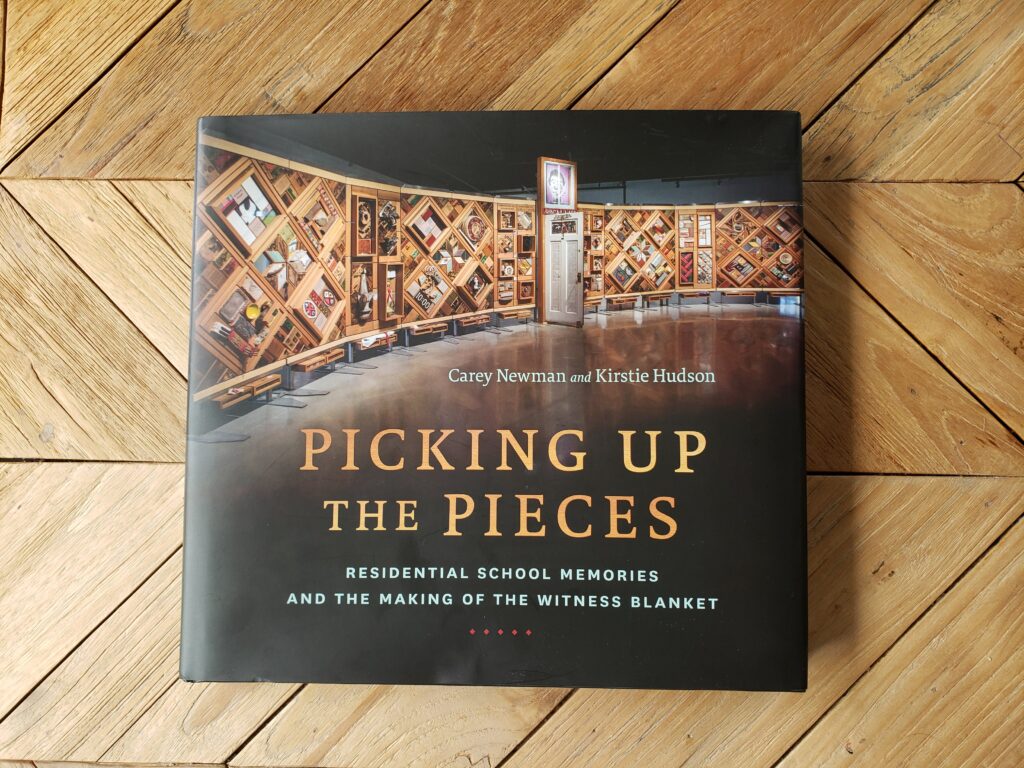
The emotional opening plenary was followed by seven sessions including a Forum for BIPOC archivists, a virtual Poster Session, and subject matter that included cultural memory, artist-run centre archives, the decolonization of archival theory, awareness-building, and challenging colonial archives.
Day Two wrapped with a dynamic and thought-provoking plenary about how archivists can consider the environmental impacts of their work and find ways to contend with #ACAClimateDread. The #ArchivistsforClimateAction plenary brought together archivist/activists from around North America to discuss the work they did as part of a worldwide Twitter Teach-in during the Global Climate Strike on Friday, September 20, 2019.
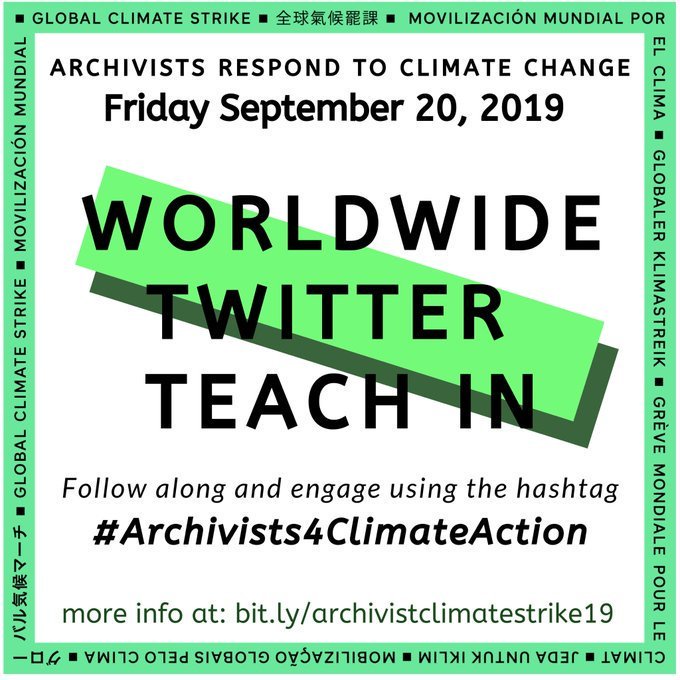
The group (Itza Carbajal, Ted Lee, Sam Winn, Krista Jamieson, Fletcher Durant, and Jessica Bushey) offered first a provocation – “For memory workers, the existential uncertainties of the Anthropocene should prompt a crisis of purpose: if there will be no one to remember what was, what will have been the purposes of memory work?”; followed by a challenge – “How can we move towards an ethos of maintenance and intentional degrowth?”; and then an invitation – asking attendees to think about “what could emerge from “the end of archives” as we know them?” Panelists then reflected on a series of questions about the sustainability of archival practices. It was heavy stuff but the session concluded with discussions of how to manage the feeling of dread and how to imagine a new future. The speakers offered some takeaways and some resources to conclude the session.
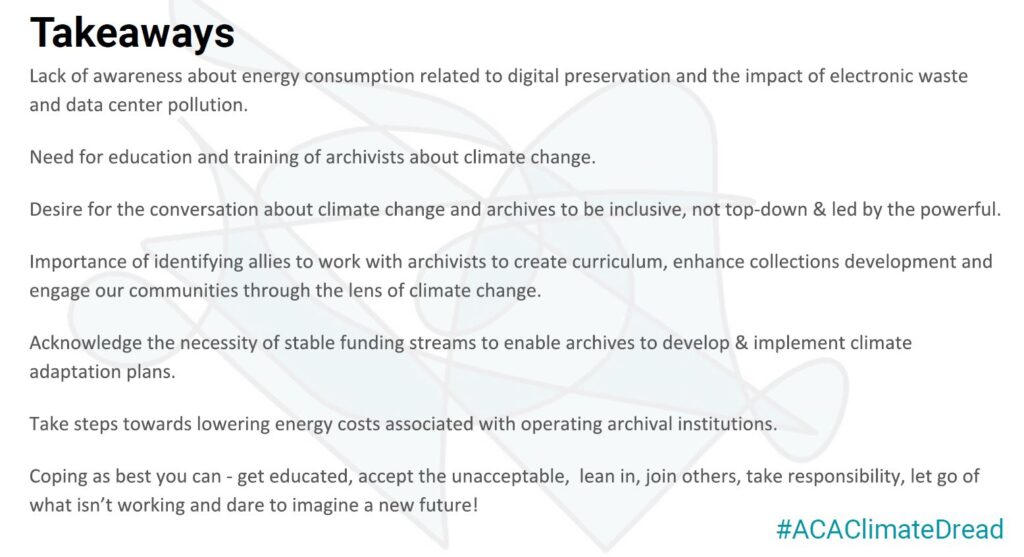
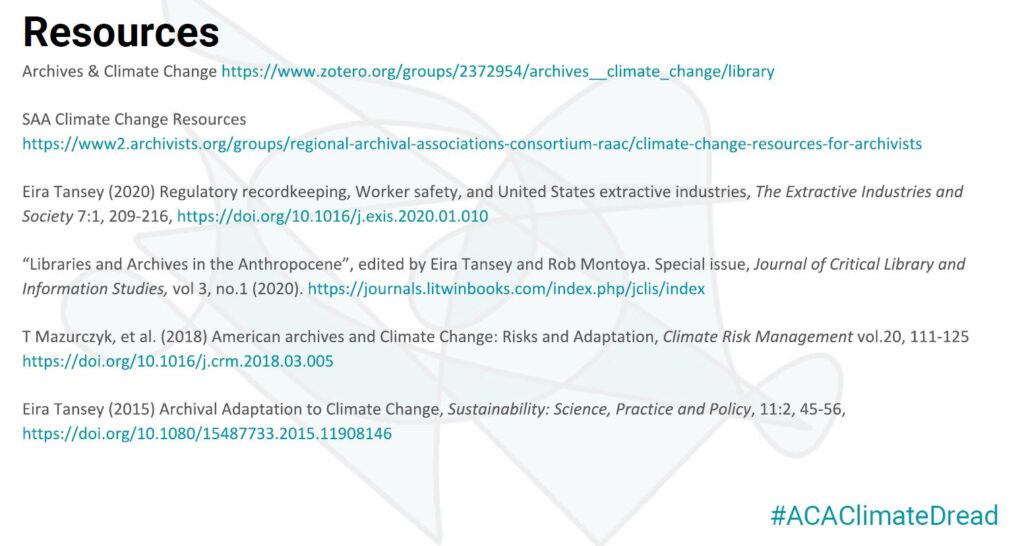
Day Three
On Day Three, we had an excellent series of nine sessions that covered the preservation of moving images, representation, access to information, digital preservation, reconciliation, data sovereignty, professionalization, trauma-informed practice, outreach, and education. There was a brilliant student session that featured three new members of the archival community sharing their important research. We were also privileged to hear from a panel of incredible archivists (Jennifer Douglas, Anna St. Onge, Genevieve Weber, Taryn Jones, Noah Duranseaud, Elizabeth Bassett, Melanie Delva, and Erin Suliak) who well and truly convinced us that it is crucial to acknowledge and support archivists’ emotional work. You can continue the conversation from that session using this padlet page or follow the project on the Hard Feelings blog.
Michelle Caswell gave the closing plenary where she argued that we need to question the valorization of reason and embrace feeling, considering both personal positionality and structural oppression. Caswell fired everyone up with her inspiring and necessary call to action to use archival skills to dismantle systems of oppression. I think I heard a virtual mic drop at the end and I know that there were individual standing ovations happening in many time zones around the world. It was the perfect way to end three phenomenal days.
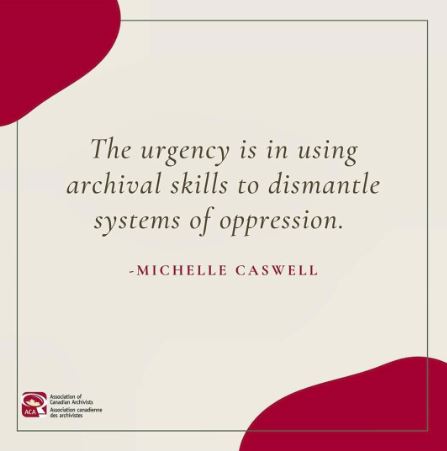
Reflections
I have now had a few weeks to reflect on the conference and I wanted to share my thoughts on some of the advantages of the virtual format:
- Accessibility: If you haven’t already had the chance, I would highly encourage you to read Sam Winn’s eloquent article about her experience at ACA 2020. The virtual conference provided unprecedented accessibility. Many remarked that they were able to feel comfortable during sessions, see to their needs as they wished, and catch up on panels they may have missed due to scheduling conflicts, time zones, or conference burnout. Attending an in-person conference can be an exhausting prospect. The Virtual ACA let you do the conference your way – whatever that looked like.
- Affordability: ACA 2020 was affordable for participants and it was affordable for the ACA. It really was a win-win. Given that we didn’t have to feed anyone or pay exorbitant AV costs to a hotel chain, the registration fees for the conference were incredibly low ($100 for members, $200 for non-members, $50 for students). Over and above the reasonable fee structure, ninety-eight students and individuals experiencing job loss or precarious employment were able to register for free. In terms of costs for the Association, the Virtual ACA cost a fraction of what it costs to host an in-person conference. For the price of coffee and snacks for one morning break, we were able to purchase a video-conferencing service, a hosting platform (Whova), offer professional closed captioning (thanks Joanne McKenzie and Sandra Burns!), support a local charity (the Downtown Eastside Women’s Centre), provide honoraria for invited speakers, and make recordings available to attendees after the conference through the Whova platform. All for between ten and fifteen thousand dollars. Compare that to the more than one hundred thousand it costs to put on an in-person event and you start to question how necessary it is to sit in a room together.
- Sustainability: 500 people from across North America and around the world attended a conference with zero carbon emissions from travel. That’s significant.
- Sociability: Of course we all missed seeing our colleagues and friends in person. Of course we all missed catching up over dinner, sharing some drinks at the pub, or playing a rousing game of baseball for all the regional glory. There is no substitute for in-person human contact. But, I would argue that the virtual conference—through the Whova app—gave attendees an opportunity to socialize in a way that is unmatched in person. It is far less intimidating to send someone a chat message in an app than it is to walk up to a stranger and introduce yourself. Whova made it possible to “meet” hundreds of people on your own terms. I now know about all of the talented artists and crafters out there in the archival community because they were able to share photos of their work. Loads of people shared photographs of their furry friends who have been keeping them company in lockdown. More than seventy-five people used the ice-breaker function and introduced themselves with an interesting question that helped us all to get to know each other better. According to Whova, the typical conference that uses their app has an average of 1204 messages sent in the app. Attendees at ACA 2020 sent more than 4100 messages to each other! And the messages keep coming while attendees continue to take advantage of the Whova app. I know we missed being together, but it’s hard to argue that ACA 2020 wasn’t social!
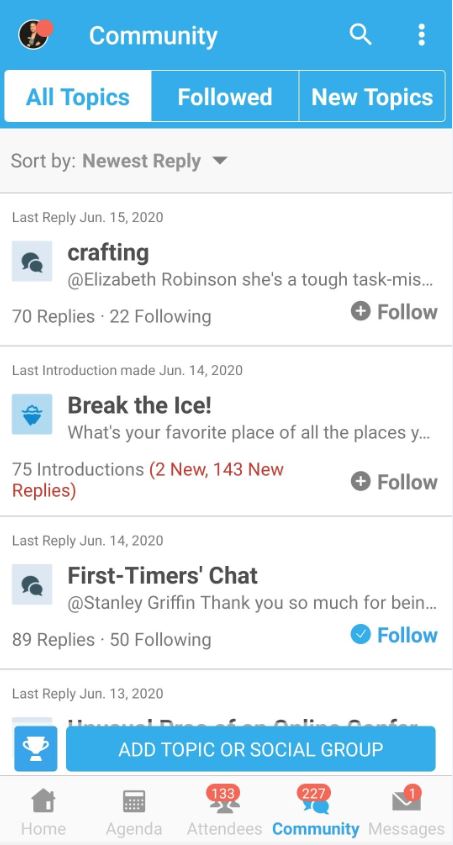
And then, just like that, it was over…
The conference left me inspired and exhausted. I can only hope that attendees felt the same way. If so, then I think we did our job well. Based on the exceedingly kind tweets that followed the conference, including a round of applause from some folks on Animal Crossing, I would say that people enjoyed themselves. That makes me so proud and so happy.
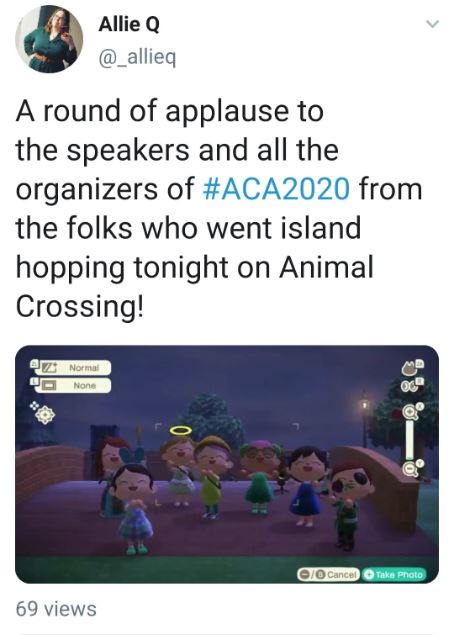
I want to close with a million thank yous to Jo McCutcheon and my Program Team – Melissa Adams, Alexandra Alisauskas, Grant Hurley, Emily MacDonald, Amanda Oliver, Emily Sommers, and Tessa Walsh. It has been such an honour to serve as Chair of the Program Team for ACA 2020. It was an experience that I will continue to reflect upon and cherish as a highlight of my professional career.
And now…I rest.
Cheers everyone. See you at ACA 2021!
